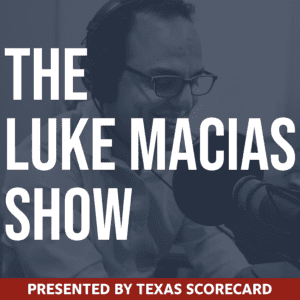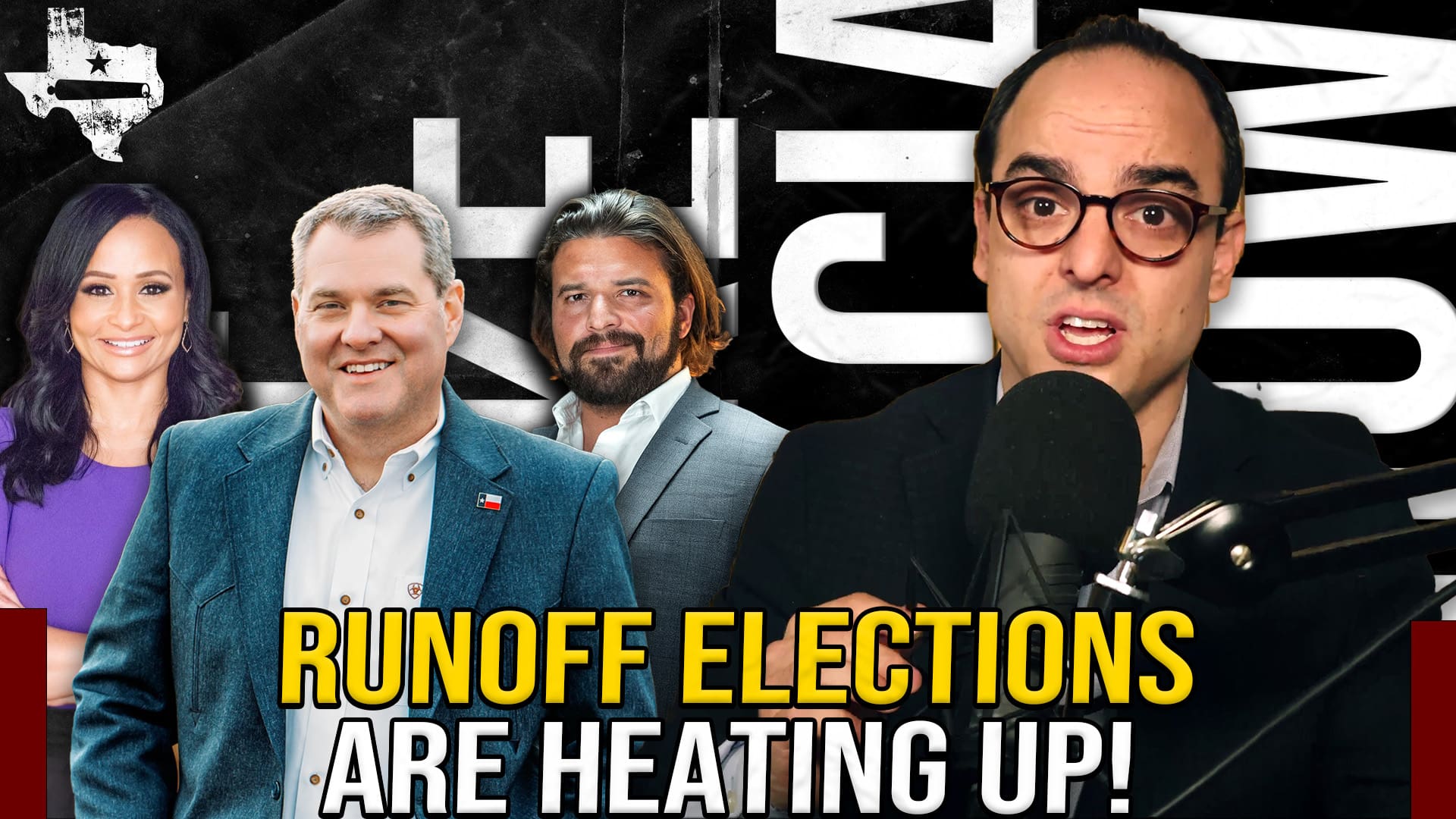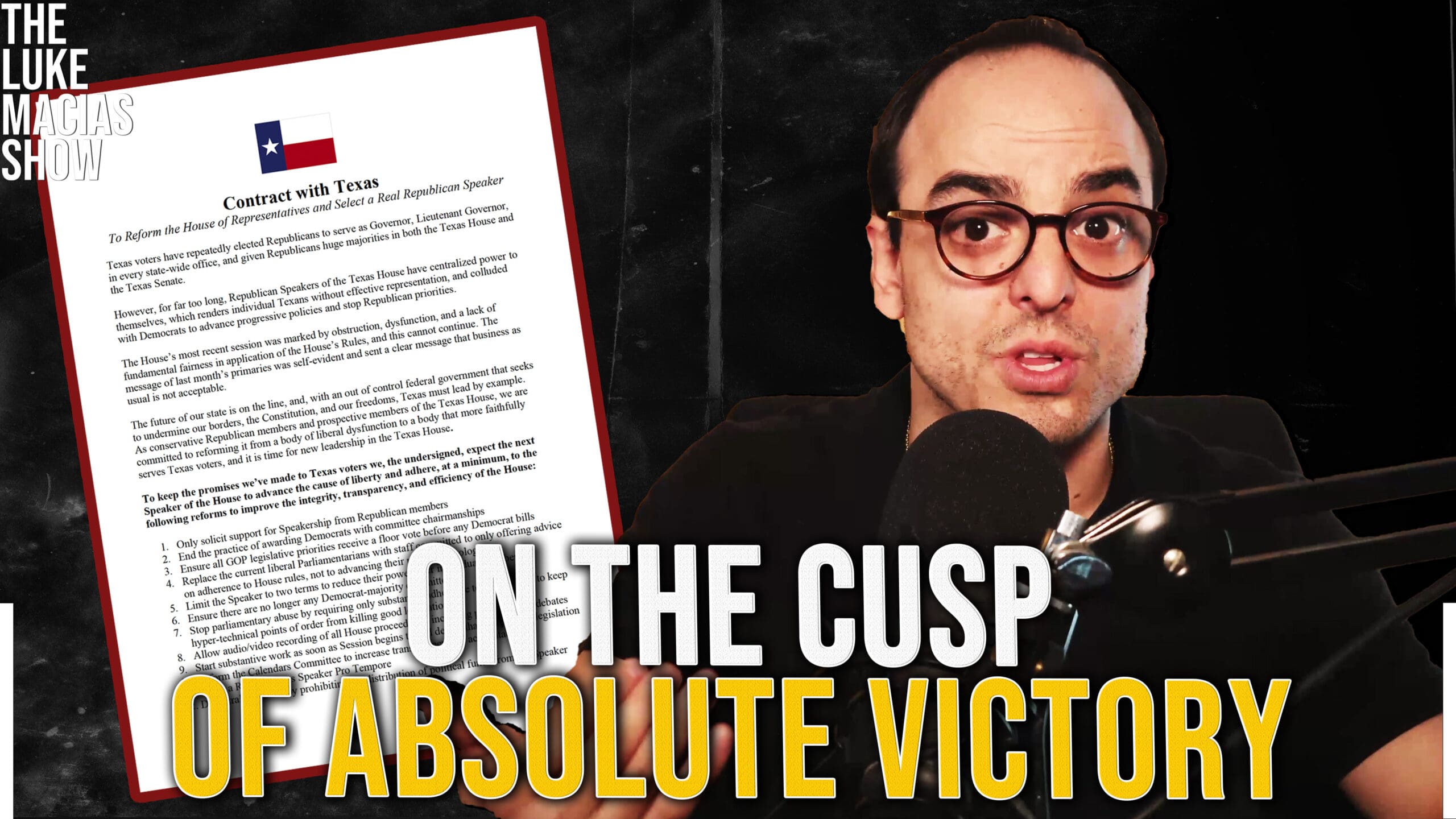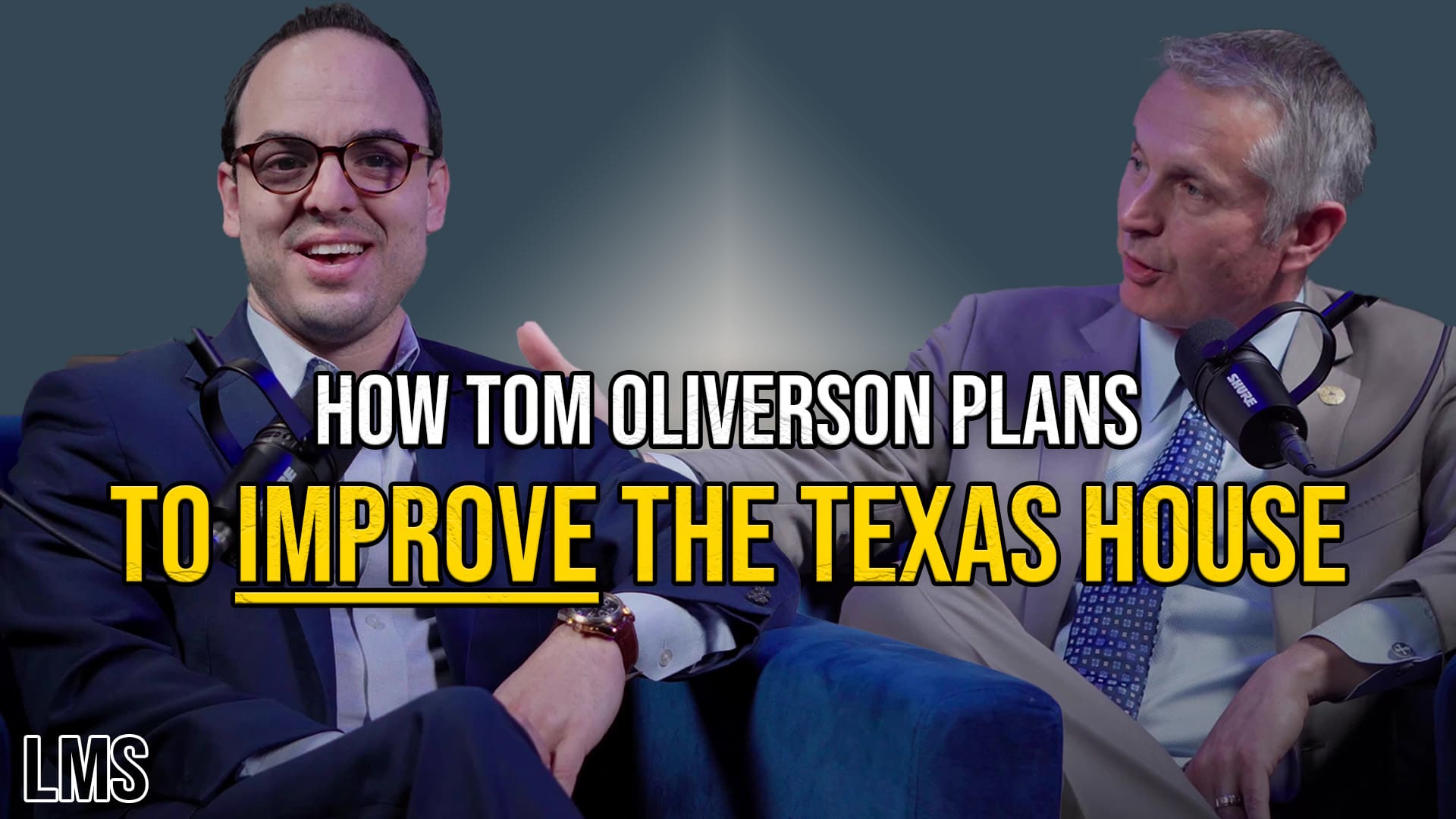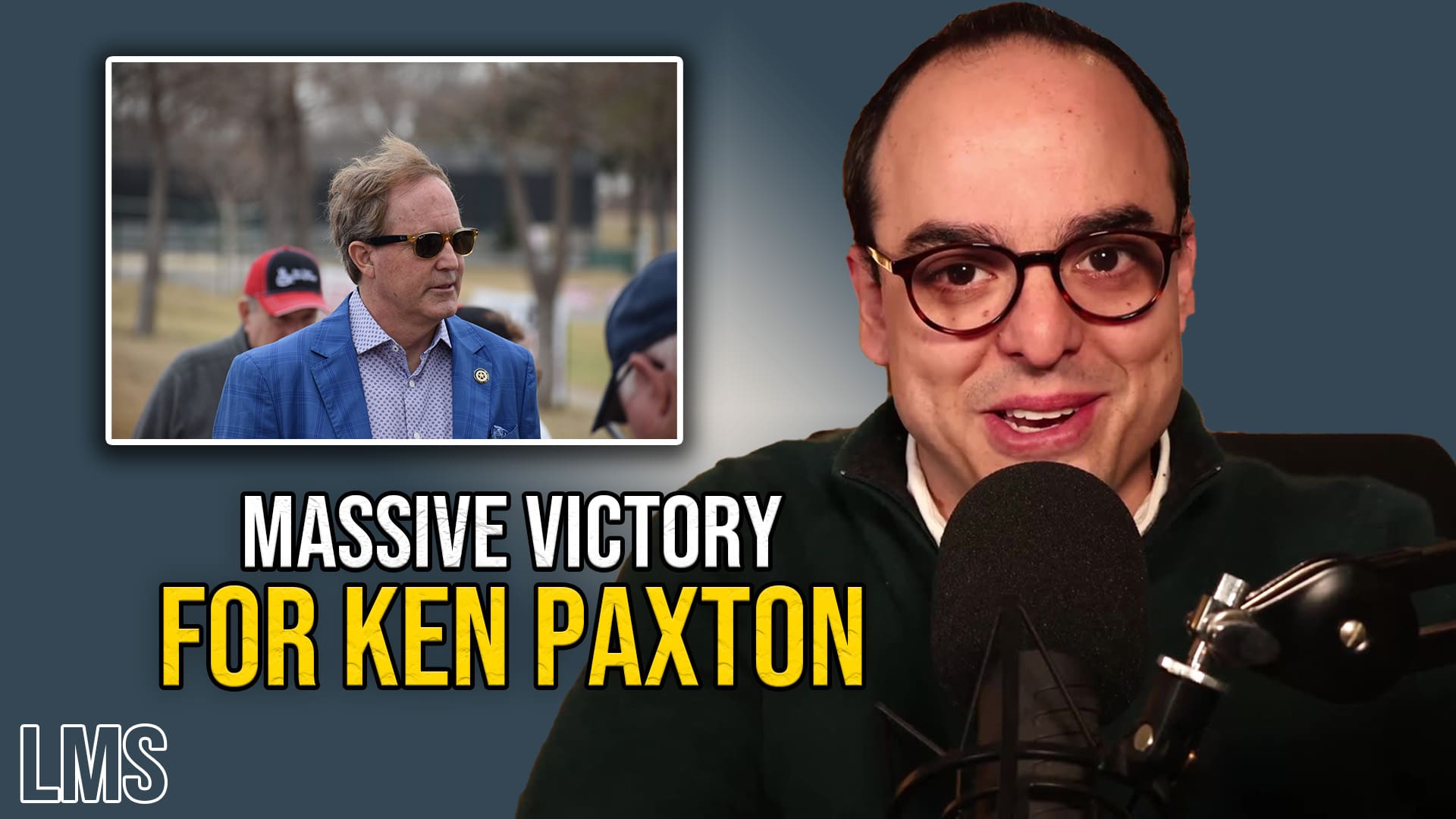
Luke Macias 0:00
How do you decide who to vote for in November? And are we going to keep funding people that hate us that are undermining our state here in Texas? These are the two questions that I asked today. And the two issues that we really dive into the difference in how to vote between November and March, and also what our budget will look like next year. I hope you enjoy the show. News, politics and special guests with a Texas twist. That’s the goal of the lunacy, a show, our nation and state are at a crossroads. And if you’re not informed, you’re not equipped to make the change our community needs, join the conversation, and join the cause for liberty.
Welcome to the Luke Misia. Show, we are going to start off today by talking about the difference in our general election November votes compared to the votes that we cast in, let’s say a Republican or Democrat primary. And you know, this is always a good time to remind you that Texas scorecard is a 501 C three. And so we are not here to broadcast an endorsement of a needle body. And that’s not what today is about today is about the difference in how we consider our vote. And I’ve been thinking about this over the last several weeks, as I’ve had different conversations with different people who start talking about the different candidates that are on the ballot and how they’re going to vote and what they’re thinking about. And I realized that it might be good just to have a conversation about why I think differently about my November vote that I do my March vote. And I wouldn’t say this has always been the case. If anything, you can say that this has been an evolution over the last 10 years or so. When you are deciding who to vote for in a primary election, you are going to evaluate the different candidates running. And you are basically going to figure out who aligns with you most on issues that you care about. And then you’re really also going to be doing a kind of character check of people to figure out who you think will actually do that. Because any of us who have gotten mail in the Republican primary, and I’m sure the same is true for the Democrat primaries. You know, Democrats never campaign to their base and say, I’m really kind of in the middle of the road. And neither do Republicans, Republicans act like I am somebody who cares about the issues you care about and will fight for those issues every single day. And so if they’re both saying the same thing, you’re gonna say, first and foremost, are there anything? Is there any issue that you differ on? In which case, I’d like to know what that is? Figure out where I fall down on that issue. And then I also then have to kind of do a gut check to figure out whether or not you’re trustworthy. And that trustworthiness could come in maybe your past actions, right? So if this is somebody who already is elected, and they have a good voting record, that’s one thing, if they are already elected and have a bad voting record, but they’re campaigning is the most conservative thing ever, then that’s another thing. And you go, Well, this cognitive dissonance that I’m viewing makes me think you’re less trustworthy in the process. Or maybe it’s who back backs them. In a primary, I’m way more concerned about like, who is giving you money? Because if you’re somebody who is largely funded by Austin lobbyists, or some big PACs that are chaired by very liberal Republicans, or for a Democrat, a very conservative Democrat, right? Then you would look at that and say, Okay, now I, the things coming out of your mouth might be the same as the other guy. But all of those special interests that I have seen fight to keep a certain type of politician in power. They’re all backing us. So maybe they know something, I don’t know. These are the type of factors that I include in my analysis when I’m deciding who to support in a primary campaign.
But November is different. And I think November is different for different people for different issues, or reasons. So for a lot of voters and in fact, a ton of voters, most voters end up basically falling into a party loyalty position. Okay? So if you’re a Democrat in Texas, like once you’re past the primary, you’re gonna vote Democrat. And if you’re a Republican in Texas, once you’re done with the primary, you’re gonna vote Republican. And you actually see that even in states where that isn’t like fully happening right away. It eventually happens. I use Dr. Oz as an example. He’s running for the United States Senate in Pennsylvania, and after a very spirited primary. He was hurting in the polls, and one of the reasons he was hurting in the polls so badly is that a good chunk of Republicans had not come home to him yet is the reference that people would use So that’s how we would, the terminology we would use to reference those voters. And the idea being that, like, they’re gonna come home, they’re just not home today. And the reason that Pennsylvania today is tight in its polling is because they’ve come home, because for most voters, they identify as one of these two parties. And then in November, they’re just kind of loyal to the party. And you get told this, well, look, we got all stick together. Look, we got to make sure we come for the home team. Hey, look, man, you know, ultimately, we vote red all the time, is what you’d hear if you go to a Republican club. And I’m sure they say the same things. If you go to a Democratic Club, I should go to more democratic clubs. Maybe I’d hear what they say. But I’m pretty sure they say the same things. For me, it’s different. See, I look at the parties as vehicles that can be used. I have an episode with Pedro Gonzalez. And y’all can go listen to that. It is, in fact, I’m looking it up right now, just so I can tell you when it actually played. But we, you know, ultimately, we had a conversation that was was very similar to this. And he articulated, I think very well how he kind of looks at the GOP. In that instance. I look at the parties as vehicles. And really, when I go into vote in November, I am participating in this democratically elected Republic, where one of these guys is going to have power for two to four years depending on the position I’m voting for. And they’re going to direct certain public policy and that time and rulemaking, and they’re going to oversee certain government agencies and fun certain things. And so the question I’m asking myself, is which of these two people would I have the biggest ability to make do the thing I want them to do? That’s really what I’m thinking about? And that’s the question I’m asking myself when deciding who to vote for. And I think that’s the question that you should ask yourself, because we’re all going to be voting here pretty soon. See, we can make elected officials do things that they don’t want to do. And in fact, we do it all the time. I’ve talked on this show about how David feeling, and Robert Nichols and all these other moderate Republicans are coming out and being really soft on the rape and incest exceptions that they would like to see in state law. It’s like they all woke up and realized, oh, my gosh, we voted for all these policies that said that a child who is the product of rape is this has the same value as all the other children, but we didn’t actually think that there’d be a point in time in which you couldn’t kill that kid. And now that we’re waking up in a reality in a Texas where that kid cannot get killed, we’re really uncomfortable with that. So we’d like to reevaluate the laws to make sure that that kid can get killed in the future. So what does this mean? What what do we take away from the Speaker of the House saying, well, the votes are there. By the way, Democrats tried to pass rape and incest exceptions on the floor multiple times, and it died every time. Why? Because the votes aren’t there. The body hasn’t changed at all. In fact, if anything, the bottom became more Republican since the last session was some special elections. And yet, according to date, feel and like, oh, the votes are there. So what that means is that there were a lot of politicians in Texas who were made to do something last session that they didn’t want to do. And it has created a policy reality that they don’t want to be reality. And now they want to try to fix it.
Unknown Speaker 9:03
See, I look at that as a good thing. I think it was Nebraska that the governor came out after Roe v. Wade was overturned and he said, Hey, we’re going to call the legislature in and we’re going to pass an eight week ban like they did in in Texas, which of course now we have with the trigger law, a complete ban, but we’re going to do an eight week ban. I think they have like 20 weeks in Nebraska. So he comes in and says we’re going to do this. And he’s going to call a special session to make it done. And within like five weeks, he called off the special session. He said I’ve I’ve had conversations with the legislature and the votes just aren’t there. You see the fact that pro lifers have pushed for so long and so hard in Texas delivered results that we couldn’t get today. If some of these same bills came before the same group of lawmakers, they wouldn’t vote for it. And that’s just the reality of where we’re at. So when I look at that, I say these guys were made to do something they didn’t want to do. constitutional carry is not something that Republican leaders in Texas wanted to do. And they successfully didn’t do it for a very long time. We’re one of the last red states to decide to have constitutional carry. And the only reason they did it was it was kind of a domino effect of things. Right. David feeling was really pissed at Dan Patrick. And so he decided this was an issue that, Dan, it’s the one issue that Dan had not been publicly as strong on as other Republican priorities that Dan was to the right of date on and so he sent it over to Dan as a hot potato. And then Dan, of course, did the right thing and didn’t sit on it and worked the Senate hard to get them on board. And then it passed out and also on the governor wasn’t going to veto it because he had a potential primary on the horizon and other problems. And so he’s just gonna sign this into law. And you had a lot of people doing things they didn’t necessarily want to do, that all of a sudden ends up with constitutional carry, no Republican leader around the state is campaigning on constitutional carry, because they didn’t want to do it. The one aspect of constitutional carry that passed into law that they passed in was a ban said, Well, you don’t have constitutional carry, unless you’re 21. And the federal court has come in and said, Texas, that restriction was unconstitutional. And the state of Texas is still fighting to try to maybe overturn that they still want the unconstitutional parts of constitutional carry, which is an oxymoron, I know. But they did something they didn’t want to do. So a lot of times, when you see a politician in November, you have these two options, you might look and go, I don’t trust this guy. I don’t trust this guy. And honestly, in my opinion, that’s okay. Because that’s politics. Now, this isn’t to say that though, that is virtuous, that it’s a good thing that they’re untrustworthy. Okay, it’s just to say that at this point in the game, when you’re in October, these are the questions that I think you should be asking yourself. I am I am not sitting here going like, well, which of these two do I trust? Because I’m just gonna be honest, for a lot of them, I don’t trust them. So then how do you vote? For what it’s worth, I think when you look at a party as a vehicle, it then changes the way you approach it. And it’s a good thing and a bad thing. So one, I’m not for the rhetoric of loyalty to party. I just don’t I don’t believe in articulating that. I don’t believe in guilt tripping people. I don’t believe in people just saying like, you just vote for this group the whole way down. I do believe in just asking the question like, which vehicle Do you think gets the country where you want it to go? And then you might go, Well, I don’t believe either of these vehicles are going to take the country where I want it to go. And I would probably agree with you. I probably go okay, you’re probably right. But see if I if I want a child to not have a sex change surgery in Texas, what needs to happen? Right. Which Attorney General is going to put pressure on CPS to do something? Which governor is going to get nervous when the national media start reporting badly? On the transitionary surgeries in Texas, when Tennessee takes more aggressive steps than Texas has taken on this issue? Because Matt Walsh had the daily wire made them do it. Put pressure on them.
Unknown Speaker 13:38
This is another good example. Vanderbilt Medical Center was transitioning children. We all knew it was happening. This is happening everywhere. There’s no like, oh my gosh, what in our backyard, this is happening. It’s happening everywhere. We know what’s happening everywhere. Matt Walsh says I’m gonna put a spotlight on it, I’m gonna talk about it. I’m gonna make sure everybody sees that this is happening. And it’s going to embarrass a bunch of legislators and the governor of Tennessee that they’re letting this happen. And within a couple of months, they’re like, Oh, we’re gonna stop this. We’re gonna push legislation to stop this. Pressure gets put on Oklahoma. They threatened to defund the hospital. That’s transitioning the kids. Did you know that the hospital that I’ve talked about for three years that transitioning kids in Texas is still funded aggressively with Texas taxpayer dollars? And you might say, Well, look, that means that the people that are there aren’t doing what you want them to do. And I’ve already said, well, everybody knows that. So there are some wins. There are some losses. There are some things we get out of people that say there are a lot of things we wish we could get out of people. But this is the type of thought process I would put into your vote in November. And that’s the question I’m asking my myself, and I think it’s the question you should ask yourself. We’re still funding. The hospital is transitioning kids. So that’s going to transition me into my other point today, which is that we are going to have more money, then we know what to do with this legislative session. And I, when I say we, it’s really not true. How do I say this differently? We are going to have a lot of money this session, okay. And legislators can come up with so many ways to spend it that they always know what to do with it. But we are going to have a lot of money, we’re going to have a $27 billion surplus. The governor has come out and said at least half of that should be sent back to the taxpayers. Dan Patrick has agreed that it should be more than half and Dadeville and hasn’t really said what he believes. But you know, no one should be surprised about that. There’s another question that I think each and every one of us is going to ask at the end of this budgetary process. And that’s going to be Are we still funding people that are destroying our society? See who you give money to says a lot about what you believe. And conservatives know this privately, right? When Pay Pal just came out and said that it can potentially take money from your account, if they decide you’re spreading disinformation or anything like that. A bunch of conservatives went in and cancelled their accounts, I’m going to find a different way to move my money. I don’t want to participate in this process. See, we realize that where we spend money says a lot about our values. And right now Texas is spending money on a lot of things that say, we value having institutions that make our state more left every day. If you go to Texas scorecard, you can read about the UT Arlington, University of Texas Arlington creating a queer safe space for students. This is a taxpayer funded entity that is governed by regents appointed wholly by our sitting governor or Republican. These are all Republican governed 100 Democrats cannot decide whether or not ut Arlin gets to create a queer safe space. They don’t we do. And not only do the regents decide that overall direction the university but the legislature decides if they keep getting money. And Oklahoma just gave us a perfect example. What would have happened last session, if the Genesis clinic at UT Southwestern had been told, Hey, you’re not getting any more money, period until you stop this to these kids. You think they would have stopped a bunch of private citizens put a ton of pressure on them and they just closed the clinic and renamed it. They put it into the pediatric wing to hide it. It’s they’re scared, but they’re still doing it. And they’re still getting funding from the state. Imagine the type of decisions they’d be making. If they were sitting there going, Hey, Republicans in the legislature have just said that they’re going to be cutting a massive amount of our funding if we don’t stop this.
Unknown Speaker 18:23
You think they’d keep transitioning the kids? We talked to you about the multiple articles about this, but the Texas School of the blind had a critical theory based program that they were instituting Texas a&m had a big pro choice Advocacy Day. We have medical schools representative Brian Slayton came out and show and his office revealed that medical schools in Texas are training doctors on how to sexually transition kids turn little boys and little girls little boys and little girls and a little boys. We are funding these people. The Texan had an article. Last week, October 6, Texas nurse fired for refusing implicit bias training. This woman is a nurse who was fired for refusing Marxist training. She had to sit down and meet with the chief diversity and equity inclusion officer of the hospital. That is a position. Now here’s the thing. Baylor Scott and White does a massive amount of work with the state of Texas. Baylor Scott and White has massive lobby teams for the state of Texas. If the if the appropriators that hold the purse strings went to Baylor Scott and White and said you will not discriminate against people based on their political viewpoints. And we really are we’ve reached that point in the state of Texas, we need viewpoint discrimination laws that say, if you have a political view, you may not be fired because that political view. And by the way, there are a lot of Republicans that have to stay quiet about what they believe, or they will be fired from their job. That’s where we’re at. It’s not okay. These businesses that said you will get vaccinated are we will fire you. A lot of them do business with the state of Texas. There’s no threat. Are we going to keep funding the people that hate us? But people that are undermining our state, the people that are tearing down at the very fabric of what makes Texas Texas the people that are chipping away at our foundation? Are they going to keep getting funded with our money? I don’t know. But that’s the question. I’m asking when it comes to the budget of Texas. And I think that more Texans will be asking that same question by the time we get around. If I, for some reason, my computer’s not connected. So I’m not going to pull up what episode it is. But if you look up Pedra Gonzalez, and looking to see us, you should be able to find the episode there. I think Pedro also articulates in that broader conversation, the earlier point that I was making about just how I view the parties in general as a vehicle, as opposed to me being some loyal participant in the process, a loyal foot soldier under underneath a party apparatus. And I think the difference is really important to articulate, understand, and be able to then use as you consider the actions you’re going to take from now until Election Day. I appreciate you listening in on what we’re doing. And the things that are happening in Texas. And I appreciate you continue to spread the word. Last month, we just had a ton of downloads and a lot of traction, a lot of people sharing the information we put out. So I really am humbled and grateful. Those of you who are on our email list, you can go to look and see us.com to get each episode every week as an email, but a lot of people responding back and I try to reply to every single one of those replies, you can go to look and see us.com and also fill out that contact form about a number of those coming in over the last several weeks that I’ve been trying to get to and connect people with but have had so many opportunities to have people just saying this is what I’m trying to do. This is the difference I’m trying to make and connect them with different people who are able to help them even accomplish more so really grateful for the network of Texans that we have built with this show. Hope that you have rated the show. If you haven’t considered doing that, consider sharing it with your friends in Texas that you know are conservative to give them an opportunity to know what’s going on in our state. I appreciate each and every one of you may God bless you and may God bless Texas.
Unknown Speaker 23:01
Thank you for listening to the Luke Misia show this program is brought to you by scorecard media. check out Texas scorecard.com to read up on all things Texas scorecard media has other podcasts as well. Yeah, they’re not as good as this one, but you should still check them out. Honestly though, visit Texas scorecard.com To see all the content they’re producing on a daily basis. If you’d like our podcast to grow, please consider subscribing to the show on whatever platform you’re listening and leave a review that helps others find the content we’re producing. Thank you. God bless you. And God bless Texas.
